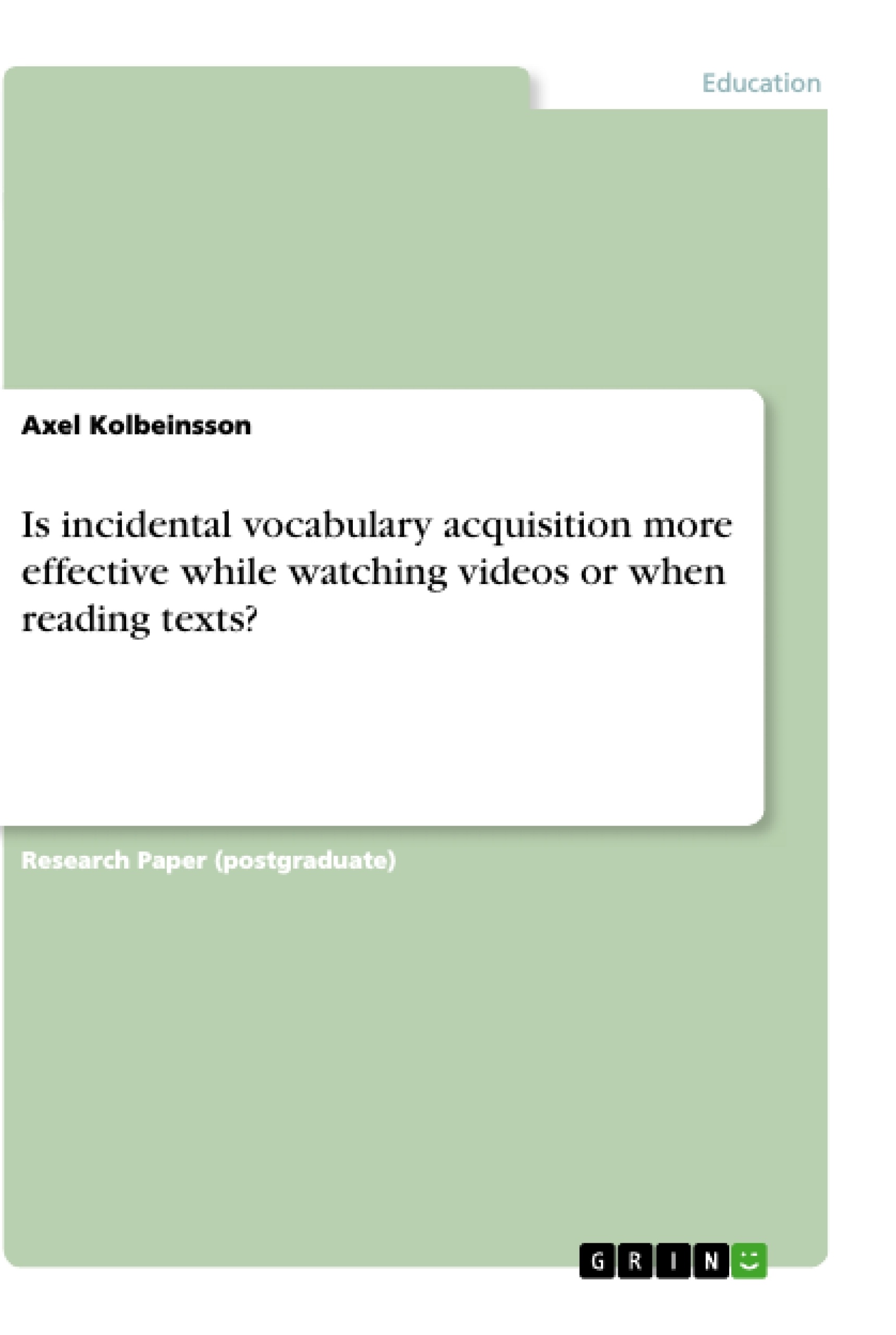This paper aims to determine, whether incidental vocabulary acquisition is more effective while watching videos or when reading texts. In order to do so, existing literature on language acquisition through textual and audiovisual input was analysed. The results show no clear answer to the research question but several key factors that determine successful acquisition in both areas. Findings suggest that language level, the amount of exposure to the target structures, the number of senses included in the task and the overall motivation of the students regarding the task and topic determine incidental vocabulary acquisition. These key factors need to be taken into account by EFL teachers when designing lesson plans. Since this paper is limited to a broad literary analysis of ENL, ESL and EFL students of various age groups, it remains unclear whether the results also apply to Austrian EFL learners. To answer this question, further empirical research is needed.
Inhaltsverzeichnis (Table of Contents)
- Incidental vs Intentional vocabulary acquisition
- Literature review
- Previous studies on incidental vocabulary acquisition
- Incidental vocabulary acquisition through texts
- Incidental vocabulary acquisition through videos
- Previous studies on incidental vocabulary acquisition
- Results
- Discussion
- Implications
- Limitations
- Conclusion and final thoughts
Zielsetzung und Themenschwerpunkte (Objectives and Key Themes)
This paper investigates the effectiveness of incidental vocabulary acquisition through watching videos compared to reading texts. The study analyzes existing literature on language acquisition via textual and audio-visual input to determine which method yields better results.
- Incidental vocabulary acquisition
- Language acquisition through texts and videos
- Factors influencing incidental vocabulary acquisition (language level, exposure, motivation)
- Comparison of incidental learning through textual and audio-visual input
- Implications for EFL teachers
Zusammenfassung der Kapitel (Chapter Summaries)
- Incidental vs Intentional vocabulary acquisition: This chapter defines key terms, differentiating between intentional and incidental language acquisition. It explores the relationship between these two forms of acquisition and discusses the role of both in language learning.
- Literature review: This chapter presents a comprehensive overview of previous studies on incidental vocabulary acquisition, drawing on the theory of incremental growth. It explores the relationship between language acquisition and the four language skills (listening, reading, speaking, writing) and examines the progression of language acquisition from reception to active production.
- Previous studies on incidental vocabulary acquisition: This section dives into the findings of specific studies on incidental vocabulary acquisition through both textual and audio-visual input. It provides examples of research methodologies and analyzes the conclusions drawn from these studies.
- Results: This chapter summarizes the findings of the literature review, analyzing the key factors influencing incidental vocabulary acquisition in both textual and audio-visual contexts.
- Discussion: This section discusses the implications of the findings for EFL teachers and explores the limitations of the study.
Schlüsselwörter (Keywords)
This paper explores the topic of incidental language acquisition with a focus on textual and audio-visual input, specifically examining the acquisition of vocabulary in English as a foreign language. It investigates the role of factors like language level, exposure to target structures, and student motivation in the effectiveness of incidental vocabulary acquisition.
Frequently Asked Questions
Is watching videos more effective than reading for learning vocabulary?
The research shows no single clear winner; effectiveness depends on factors like language level, motivation, and the amount of exposure to target structures.
What is incidental vocabulary acquisition?
It refers to learning new words as a "by-product" of another activity, such as watching a movie or reading a story, rather than through intentional study.
What are the key factors for successful incidental learning?
Key factors include the learner's language proficiency, the frequency of contact with new words, and how many senses (hearing, seeing) are involved in the task.
How should EFL teachers use these findings?
Teachers should design lesson plans that combine both textual and audio-visual input while considering student motivation and appropriate difficulty levels.
What is the "theory of incremental growth" mentioned in the paper?
It suggests that vocabulary knowledge develops gradually through repeated exposures in different contexts rather than all at once.
Does the study apply specifically to Austrian students?
The paper is based on a broad analysis of various groups; further empirical research is needed to confirm if the results apply specifically to Austrian EFL learners.
- Citation du texte
- Axel Kolbeinsson (Auteur), 2022, Is incidental vocabulary acquisition more effective while watching videos or when reading texts?, Munich, GRIN Verlag, https://www.grin.com/document/1191797



